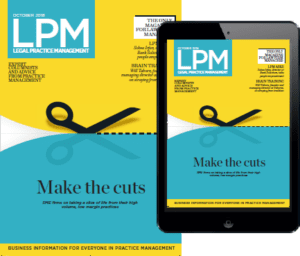
Leveraging Azure and Office 365 to deliver client-focused solutions
The more technologies that enter the market, the more client expectations are changing – and clients are demanding that firms drive improvements in their service delivery model by introducing solutions that enable collaboration, efficiency, and transparency, says Aaron Naisbitt, sales director at CTS.
Leading law firms are leveraging cloud to meet and exceed client expectations, building technology platforms with the client in mind.These firms are providing a data-based, customer-focused, agile delivery of legal services.
In this blog, we will explore how Microsoft Azure and Office 365 enables fast deployment of new tools and enhancement of service, allowing law firms to deliver client-focused solutions.
Proactive legal services
Microsoft Office 365 has become a staple in many law firms due to its versatility, functionality, and accessibility.
Microsoft’s PowerApps enables IT departments to custom-build applications, such as lead capture, meeting bookings and case summary requests, easily and quickly. Such applications can accommodate business needs or solve challenges when unable to find a suitable, cost-effective, off-the-shelf solution.
Microsoft describes PowerApps as being the “low-code approach to application development”, meaning that apps can be built and developed without the need for extensive technical or DevOps skills. This enables the quick deployment of an app, reducing the costs associated with traditional, time-consuming app development.
Being a Microsoft solution, PowerApps can be easily integrated with other Microsoft tools, and furthermore, can be used to automate workflows between different Microsoft Office 365 solutions.
Adding value with automation
The integration of Artificial Intelligence (AI) and legal procedures has been accelerated this past year, in order to streamline processes, address bottlenecks and improve client engagement in a fully digital world.
Law firms can apply AI to their business-critical needs with the new Azure AI capabilities to drive impact, deliver high-quality client experiences and highlight new opportunities. Azure AI enables firms to develop AI-powered applications that deliver high-quality user experience, build models that can optimise business processes, and use knowledge-mining to reveal useful insights.
Within the legal sector, AI may be introduced in relation to e-bundling tools, where document search functions and automatic redaction of sensitive information can allow lawyers and paralegals to work more efficiently, freeing up time spent on administrative tasks that can be re-focused on delivering value-added activities for their clients.
Additionally, the rise of chatbots has meant clients can use this technology to gain efficient, real-time responses, which, studies have shown, is a critical factor in higher client satisfaction. Firms can also use chatbots to gain insight into their client base via data collection, to optimise their work processes, saving time and money, and to aid the client intake process.
Improved client experience and satisfaction
For such a competitive sector, leveraging all the tools available to increase productivity, streamline processes and build client relationships is essential. With Office 365, firms can quickly and easily deploy tools on an as-needed basis, allowing them to tailor their operations, as necessary.
Microsoft Teams enables law firms to improve client collaboration via a number of different functions including instant messaging, video conferencing and content sharing. Through tools such as SharePoint and OneDrive, lawyers can safely and efficiently manage, store and track communications with clients. Taking a client-focused collaborative approach can deliver higher client satisfaction, which can drive new client acquisition and business growth.
Actionable insights to improve service delivery
Today, ‘Big Data’ is the cornerstone of innovation within successful law firms. This wide range of data can give firms valuable business insights that enable them to improve their service delivery and increase profits – with the Business Intelligence (BI) solutions that Microsoft offers, law firms can transform data insight into proactive, value-add actions.
Azure provides secure, high-performance analytics that can drive better, faster decision-making. With BI systems, law firms can better understand client behaviour, meet and exceed expectations, and proactively identify opportunities for improvement.

The only constant in life now is technological change
Nick Hayne, head of professional services at Quiss, says considering how the modern workplace will change for law firms, perhaps now is also the time to re-think the delivery of legal services.
As 2021 gets into a more optimistic stride, most law firms will breathe a sigh of relief at having come through an incredibly challenging period relatively unscathed. But the future offers a variety of looming challenges, from a dispersed workforce to the rapidly increasing threat of cybercrime.
Considering how the modern workplace will change for law firms, perhaps now is also the time to re-think the delivery of legal services. Firms have been given an insight into exactly what’s possible with dispersed teams when technology is better utilised.
The shift in thinking started with the first lockdown, as firms scrambled to adopt cloud-based technologies to support remote work and ensure secure collaboration, both within the firm and, most importantly, with clients. The latter benefitted from better, quicker communication, direct with their legal advisers.
Necessity is the mother of invention
The working model has been refined throughout the pandemic and it has become evident that law firm clients and prospects not only rely on technology like never before but understand the benefits on offer, with few likely to eschew the changes for a return to meetings in lawyers’ offices.
While some scientific studies suggest it takes66 days for behavioural changes to take effect, the lockdowns have ensured people adapted their behaviours to meet their needs at the time, which, in turn, has shaped their expectations for working with their clients and their legal service providers.
Adopting technologies out of necessity has become an everyday convenience, with video conferencing a prime example, offering a huge time-saving benefit by excluding travel. It also extends the reach of smaller, regional firms as distance is more of a secondary priority, next to quality of service delivery.
A portal to profitability
Technology is pushing into caseload management and revenue collection, with more law firms choosing to adopt technology that enables them to deploy client portals easily and rapidly. This not only brings them closer to the client, but also provides efficiency, transparency and consistency.
Those agile firms already using these technologies were much better prepared to transition to remote working during the initial lockdowns and now, a reversal is highly unlikely. Portals allow law firms and their clients to work more closely in a relationship built on trust, rather than distress. They deliver a personalised workspace to share documents easily and securely, collaborate on matters, manage projects effectively and provide value-added products and services. All the while demonstrating the firm understands technology and the benefits on offer through appropriate application. And Quiss can help you understand what technology you need to deploy, now.
Will AI finally kill the billable hour? The rise of value-based pricing

Is your PMS holding your SME law firm back?
Most Popular

Where are the challenges for SME law firm leadership changing?

The leading annual picture of SME law firms' changing strategic priorities
TA Triumph-Adler provides tailored support to meet compliance requirements

Law firms undertaking identity verification checks must register as an ASCP

Robust onboarding processes are fundamental to effective risk prevention

Osprey Approach's webinar explores the benefits of a digital-first approach




